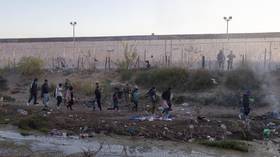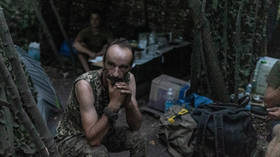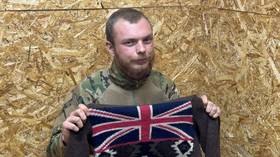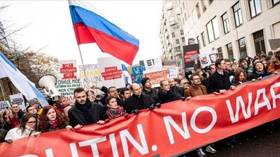Why does the Western liberal media love Russian criminals?
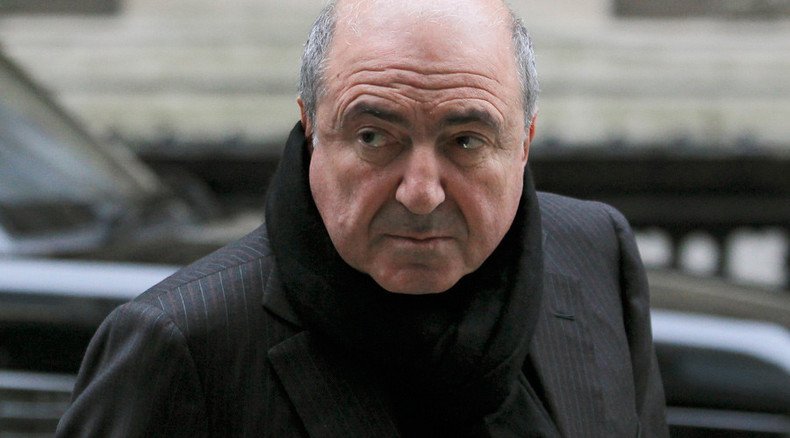
When you lie down with the dogs, you wake up with the fleas. Western media is shattering its own credibility by soft-soaping post-Soviet criminals.
“We have lost all the things we had with Yeltsin. It’s a great tragedy for Russia and its people.” One reads the line twice, to absorb the distance between perception and reality, and to realise how superficial the media can be.
According to the Guardian’s Luke Harding, Sergei Pugachev uttered the above last week in Nice, France. If I didn’t know better, I’d swear Harding and Pugachev were trying to be funny. Alas, I do know better and they were not.
Anybody who knows even the smallest amount about Russia is fully aware that the 90s are regarded as the nation’s nadir. Most political figures of the age are about as well regarded as tooth-extraction, without anesthetic. Russians over-30 can’t help but shudder when the subject is broached. It was a stretch of extraordinary suffering in Russia. It was also a period when lawlessness ruled.
The Yeltsin-era is remembered as a time when the president was an alcohol-swilling halfwit, and Chechnya was trying to separate from the then chaotic Russian state. Supermarket shelves, while not necessarily empty, certainly lacked variety. Medical specialists were earning a meager $75 a month (if they were lucky) and life expectancy for males had dropped to a shocking 57 years.
By the start of Yeltsin’s second term, Russia's death rate had passed immediate post-war levels. Curable diseases such as measles and diphtheria had reached epidemic numbers unseen since the Romanov's ruled from Petrograd. At the same time, rates of cancer, heart disease and tuberculosis were the highest of any industrialized country in the world.
The birthrate had collapsed. In Moscow, it was as low as 8.2 per 1,000 population. Amidst all this, the world’s largest country was being run by a small clique of amazingly wealthy oligarchs. Some of them - like Berezovsky, Khodorkovsky and Gusinsky - became household names and hate figures for ordinary Russians. Rather than investing their stolen money in the Russian economy, the kleptocrats shipped their cash to New York and London. Naturally, Yeltsin was very popular with politicians in the West - especially in the US and Great Britain.
That Riviera Touch
Back in 2008, the Guardian hadn’t completed its commercially-driven about-turn to American style right-wing values. Still clinging to the compassionate British left philosophy that was once its trademark, it told the truth about Yeltsin’s Russia. The oligarchs were “about as popular with your average Russian as a man idly burning bundles of £50s outside an orphanage,”wrote Andrew Mueller.
In a bout of revisionism that would impress Plato himself, Harding and Pugachev want us to believe that 90’s Russia was a great place. In reality, it was a humiliated country on the verge of implosion; a wild society where basic human dignity was frequently absent. In the interview - in which Harding notably questions Pugachev in English - the Guardian reporter makes no attempt to query how the fugitive manages to live in the south of France after his passports were impounded in Britain. Nor does he establish why Pugachev would feel safer in Nice than in London. Proportionally, there are far more Russians on the Cote D’Azur than in the UK capital.
Pugachev is currently on an Interpol wanted list. In 2010, his Moscow bank Mezhprombank defaulted on its debts and lost its license. Since then, Russia’s Deposit Insurance Agency has been trying to prosecute the former billionaire. Back in March, Pugachev told the Financial Times that he couldn’t afford a lawyer. He revealed to Harding that he still had $70 million. British justice, while expensive, is not that expensive.
Harding’s interview with Pugachev was just the latest in a series of Western media puff-pieces where post-Soviet criminal suspects can have the past practically whitewashed in exchange for delivering a few anti-Putin sound bites.
It's "just not right"
Just imagine the London media reaction if Moscow-based financial newspaper Vedomosti, for example, began to soft-soap wanted English criminals because they were prepared to bad-mouth David Cameron? Russia’s ambassador to London, Alexander Yakovenko, mentioned on Twitter that “dozens of persons on Russia’s extradition list” are in the UK.
PM @David_Cameron wants to cleanse London of dirty money. But dozens of persons on Russia's extradition list from UK. pic.twitter.com/HOibg3JzqJ
— Alexander Yakovenko (@Amb_Yakovenko) July 28, 2015This was in response to David Cameron’s ‘crusade’ against dirty money. A movement he has joined with all the enthusiasm of a 'Sloane Ranger' sipping pints at a Workingman’s club in Sunderland.
There’s also the case of Andrei Borodin. Wanted in Russia on corruption and fraud charges, he bought Britain’s most expensive house for £140 million in Henley-on-Thames. That’s $218 million for a house. The UK media aren’t interested in where the money came from, of course. Alexander Lebedev, part-owner of Russia’s leading opposition newspaper Novaya Gazeta, has described Britain’s decision to grant Borodin asylum as “just not right.” It should be noted that Lebedev is no fan of the Kremlin, or President Putin.
Another former Guardian favorite was the late billionaire businessman Boris Berezovsky, who admitted to helping fix the 1996 Russian Presidential election, via his TV channels, as mentioned by Harding in 2013 (Berezovsky, wanted by the Russian authorities, died in strange circumstances in 2013). However, in Harding’s interview with Pugachev, he leaves unchallenged the latter’s assertion that 1996 was “Russia’s last free election.” Even former Yeltsin-era Minister Anatoly Chubais has admitted violations in the 1996 poll. This Exile magazine piece from 2007, by Alexander Zaitchik and Mark Ames, gives more background on how the West cynically ignored wrong-doing to serve its own ends.
The Kremlin critics do not necessarily have to be Russian. Georgia’s former President Mikhail Saakashvili, for example, is regularly wheeled out for some Putin bashing. Here in the Wall Street Journal for instance and also on BBC’s HARDtalk show. This particular episode probably should have been dubbed ‘Softtalk’ - the questions were so harmless. Yet what most Western media ignores is that Saakashvili is a wanted criminal suspect in his homeland.
The Western press uncritically accepts convicted Russian criminals and fugitives from justice as martyrs. In obviously PR-agency organized interviews, they are allowed to embellish their reputations to their heart’s content. However, there’s a proviso, they must bad-mouth Russia’s current government to the greatest possible extent. The more alleged insights into Putin’s ‘inner-circle’ the more prominent the puff piece will be. If you only care about moral standards when they can be used against your enemies, then you probably don't really care about moral standards.
The statements, views and opinions expressed in this column are solely those of the author and do not necessarily represent those of RT.
The statements, views and opinions expressed in this column are solely those of the author and do not necessarily represent those of RT.






